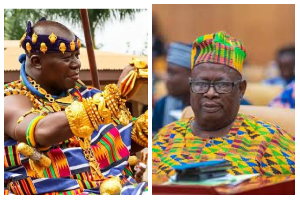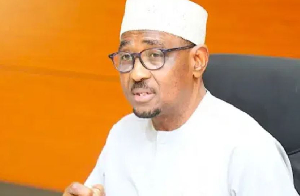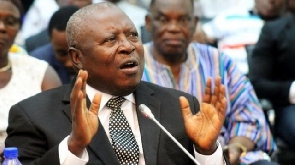It was heart-warming and nerve-calming on January 3rd, 2009 when the hand of God moved over our dear nation in mysterious ways resulting in a successful declaration of the final results of the December 7 to January 2 presidential elections by Dr. Kwadwo Afari-Gyan, followed by President-elect Prof. John Evans Atta Mills’ victory speech, and then finally, after a brief delay, ending with Nana Akufo-Addo congratulating the winner and conceding defeat to allow Ghana to “move forward” in a different direction.
President-elect Atta Mills had referred to his presidential victory in his speech as “a long struggle” and acknowledged all the presidential candidates, most especially, Nana Akufo-Addo for giving him a good fight. This was a magnanimous, moderate, and all-inclusive speech reflecting his nature and experience from his two previous campaigns when he showed his love for this nation by conceding defeat even before there were any thoughts of tension or violence from any quarters. However, it was the context of the message from Nana Akufo-Addo that left a lot to be desired because, deliberately or not, it was riddled with many mis-statements and errors that need to be pointed out and the records set straight.
Nana Akufo-Addo was quoted to have said that, "by stating that there is criminal conduct in some constituencies of the Volta Region and yet announcing the results, the Electoral Commission has given the unfortunate impression that it does not matter how votes are being obtained as long as they are duly recorded". Well, the Electoral Commissioner never stated that “there is criminal conduct in some constituencies of the Volta Region”. What he said was that “some of the evidence given by the NPP regarding Volta Region bothered around criminality which fell outside the authority of the EC; however, he did not find anything wrong with the electoral process itself”. What he was basically trying to say was that, if the NPP have any such evidence of criminality (which was planted evidence anyway), they should seek re-dress from the security services and not the EC.
I think that the real acts of criminality during this process was the point at which reports started coming in from the strong room of the EC that newly concocted figures had started pouring in from some of the constituencies in the Ashanti region which indicated turn-outs of between 94 percent and 146 percent when results from those constituencies had already been received which reflected the national average turn-out of about 70 percent. This was after Mr. Kwabena Agyapong and Mr. Dan Botwe were reported to have visited the strong room briefly. I really wish this incident would be investigated thoroughly and the people found responsible brought to book because this was no less than an attempted coup d’etat. If any group of persons ever thinks that they can win an election with a voter turn-out of 94 percent to 146 percent, then they should better look towards Russia, North Korea or Iran for their political career.
Nana Akufo-Addo was also quoted to have said that "the use of violence for electoral advantage is unacceptable in all circumstances". This is a very accurate statement, but I cannot understand why the NPP and Nana would only recognize violence and intimidation when they see it on their side. For your information, the Coalition of Domestic Election Observers (CODEO) did find that cases of intimidation and violence in the Volta Region dropped by 4 cases during the run-off election compared to an increase of 35 and 38 cases in the Ashanti and Eastern regions respectively, which were the only two regions Nana Akufo-Addo won the majority votes. Also, in all the media reports I picked up regarding acts of violence on the media, it was Nana’s supporters who had some criteria for picking on perceived pro-NDC media houses, or those accused of having projected the winner ahead of the EC and venting violently on them. Some of these acts were caught live on air or on tape, including those that happened at the entrance to Nana’s residence during one of his press conferences.
It was also attributed to Nana that he urged the President-elect to publicly condemn acts of violence and intimidation by his sympathisers and to take concrete steps to restrain them in order not to undermine the peace and stability of the nation. I do not believe that Nana or any of his advisors saw, head or read the president-elect’s victory speech before making this statement and I shall not belabor this point except to say there are hardly any acts of violence from the jubilant Ghanaians to condemn.
Nana was also quoted as saying that, "This is a divided country…….Our nation is at the crossroads……. ". I have heard such statements from a lot people about Ghana and I humbly disagree. We are not divided and we are not at the crossroads. I think that the average Ghanaian electorate is on the centre-left of the political spectrum. By their ideologies, the NDC and the Nkrumahist parties are left leaning and the NPP or capitalist are right leaning. However, both sides will always have to move to the center to be able to appeal to the masses. For example, the national health insurance scheme, the school feeding programme, the youth employment programme and the unemployment payment scheme are all against capitalist principles, but were all adopted by the NPP to enable them appear as though they are to the left or center of the political spectrum. Take these programmes out and all you will see is a bunch of extremely rich people on one side, and a massive number of poor people on the other. To say that we are divided means that people are so attached to these ideologies that they will vote for any person on the ballot no matter what policies are being offered. This has not been the case; at least not in this year’s elections, in which we saw Central, Greater Accra, and Western regions as well as parts of the Northern region reversed their votes from the NPP in the two previous elections to the NDC. What will actually divide this country are the politicians who do not know how to lose an election, and so will hold the country to ransom under threats of legal actions that they know will not hold but only serve to increase the tension and threaten the peace of the country.
Finally, thanks to the moderates in the NPP and Nana’s own alleged impatience with President JA Kuffour, reason has been brought to bear on him and the few extremist in his campaign who were of the illusion that no matter what it takes; there was only one person who could ascend to the presidency of Ghana this year. At least Nana is now back to “believing in Ghana” and that is a good sign even though I do not think next time around the NPP delegates will or should believe in his believe in Ghana.
Malik B. Salifu Beltsville Maryland, USA
Opinions of Wednesday, 7 January 2009
Columnist: Salifu, Malik B.














